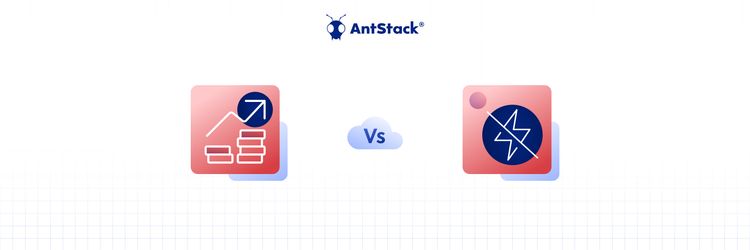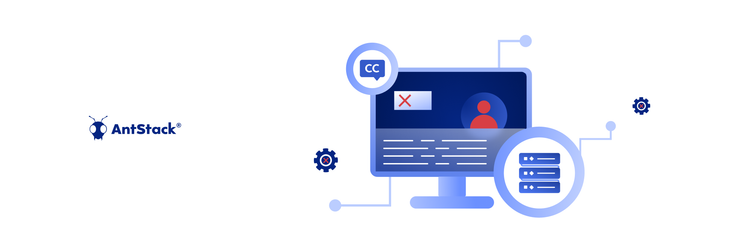"We tried a cloud migration two years ago. It didn't end well." - Jeevan Dongre (CTO, Co-Founder, AntStack)
These words from the CTO of a major healthcare provider still ring in my ears. His team had spent nine months and nearly $2 million on a lift-and-shift cloud migration project that was eventually rolled back.
Their experience isn’t unique. In healthcare, cloud migrations fail at an alarming rate not because the cloud doesn't work, but because the method doesn't match the mission.
What does work? A modernization-first approach using serverless focused on agility, security, and sustainability rather than brute-force migration.
After helping many healthcare organizations modernize successfully with serverless, we’ve identified three persistent roadblocks and proven ways to overcome them.
Roadblock #1: The Legacy Integration Nightmare
A therapeutics company’s CIO nailed the problem:
“We have 15-year-old EHR systems talking to 10-year-old billing platforms talking to 5-year-old patient portals. None of them were designed for the cloud. All of them are mission-critical. How do we modernize without breaking everything?”
The Failed Approach:
"Big bang modernization" attempting to rebuild or replace all interfaces at once almost never works in healthcare. The risk to patient safety and compliance is simply too high.
One hospital network we worked with had 30 interfaces to rewrite. They got through seven before realizing every single one was more complex than expected.
The Working Solution: Interface Sheltering + Serverless Wrappers
Instead of replacing everything, we wrap legacy systems with a serverless-first interface layer, enabling controlled evolution rather than wholesale change.
When Landauer needed to modernize access to 32 million records, we used this very method. Serverless functions acted as API wrappers, translating old protocols into modern endpoints.
The result? Zero downtime. No disruption for 1.8 million users.
Key Components:
API Gateway & Lambda Layer – Consistent endpoints for legacy systems, no code changes needed
Transformation Services – Format conversions between old systems and new cloud-native apps
Event-Driven Asynchrony – Decoupling dependencies, so systems don't break under load
Feature Flags – Gradual rollout without high-stakes deployments
“With serverless wrappers, our systems modernized around the legacy core without touching it,” one healthcare CTO told us. “The EHR never even knew we’d changed things.”
Roadblock #2: The Compliance & Security Paralysis
“Compliance and security aspects of the applications are much easier with serverless.”
Compliance hesitation is real. But many organizations misunderstand cloud security as a liability when, in fact, serverless architectures often improve compliance posture.
The Failed Approach:
"Permission-seeking behavior" constantly requesting blanket approval from security teams without specific solutions results in gridlock.
One biopharma firm spent eight months in this loop, with no production deployments. Their VP of Engineering called it:
“Security theater. Everyone felt busy, but nothing got safer or built.”
The Working Solution: Security-First Serverless Adoption
Rather than positioning compliance as a blocker, serverless modernization makes compliance the goal of automating and enhancing what legacy systems couldn’t.
With a patient-data startup, we mapped every HIPAA requirement to a specific serverless capability:
Data Encryption – Built-in encryption at rest and in transit using AWS KMS
Access Controls – Role-based access and scoped permissions with IAM
Audit Logging – Centralized logs and real-time alerts via CloudWatch and EventBridge
Disaster Recovery – Built-in multi-region redundancy and automated failovers
“Serverless eliminated legacy risks we’d been tolerating for years,” the company’s CISO said. “Now I insist we modernize this way.”
Our Compliance Improvement Matrix helped demonstrate how serverless not only preserves HIPAA requirements it makes them automatic, scalable, and more cost-effective.
Roadblock #3: The Expertise Gap
“We just don’t have anyone who knows how to architect for serverless.”
This is the most honest and most solvable challenge. Serverless architecture requires a mindset shift, not just technical knowledge.
The Failed Approach:
“Train and hope” sending teams to cloud bootcamps and expecting immediate results often leads to re-creating legacy complexity in the cloud.
One medical device company did just that.
“We moved to AWS but kept the old patterns. No scalability, higher cost, and nobody knew why.”
The Working Solution: Embedded Hybrid Teams for Serverless Uplift
Our proven solution is the hybrid team model: embed serverless specialists into internal teams to co-build, coach, and upskill.
At a therapeutics company, we embedded two serverless architects into their engineering org. Within 90 days:
4× faster app delivery
70% reduction in manual workflows
60% lower infra cost
100% internal ownership of new services
The secret? Pair programming, real-world use cases, and gradual uplift not classroom training.
Core Tactics:
Pair Programming – Skill transfer through live collaboration
Architecture Decision Records (ADRs) – Shared language for future decisions
Incremental Complexity – Start small, scale fast
Internal Champions – Turn your team into evangelists
“Our developers were writing Lambda functions solo in 3 months. Now they’re onboarding new hires,” said the company’s VP of Engineering.
From Roadblocks to Results: A 4-Phase Serverless Modernization Playbook
Instead of one giant leap, we recommend a strangler-fig-style modernization path, focusing on serverless-first workloads that gradually replace legacy systems:
Phase 1: Parallel Start – Serverless + Legacy Coexistence
Begin with low-risk workloads (dashboards, batch jobs)
Introduce API gateways and serverless interfaces to legacy systems
Launch internal-external hybrid teams
Build your Compliance Improvement Matrix
Phase 2: Gradual Modernization of Non-Critical Workloads
Modernize pipelines, analytics, and log processing with serverless
Incrementally improve security and audit visibility
Guide internal teams through real deployments
Document small wins to drive org-wide momentum
Phase 3: Serverless for Core & Compliance-Heavy Systems
Upgrade clinical systems like EHRs, support tools, and patient records
Shift to event-driven architectures and serverless databases
Expand team autonomy and reduce vendor lock-in
Begin retiring legacy infrastructure
Phase 4: Fully Serverless, Fully Agile
Transition to real-time services and smart patient monitoring
Adopt advanced policy-as-code and continuous compliance
Complete knowledge transfer internally
Optimize for scale, uptime, and cost
Real-World Results from Healthcare Serverless Modernization
Hospital Network: Reduced patient data latency from 5s to 500ms. Infra cost cut by 50%.
Medical Device Company: Achieved HIPAA-ready status in 45 days down from 6 months.
Therapeutics Startup: 300% faster development with 60% infra savings.
Your Serverless Path Forward
If you're a healthcare tech leader staring down these roadblocks, you're not alone. We’ve codified everything we’ve learned into a comprehensive guide designed for modern healthcare orgs.
Download the Engineering Leader’s Playbook:
Interface sheltering templates
Serverless-first security maps
Knowledge transfer checklists
4-phase implementation roadmap
Modernization isn’t just about replacing technology. It’s about building resilience, compliance, and velocity into your organization: one service, one function, one win at a time.
With serverless, modernization becomes a series of smart decisions not a single risky bet.









